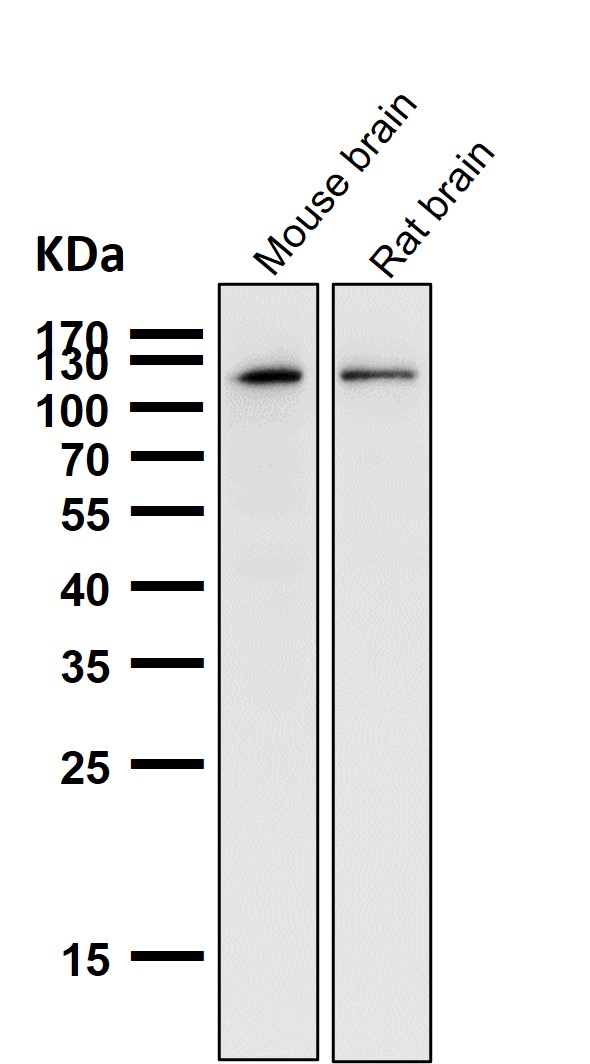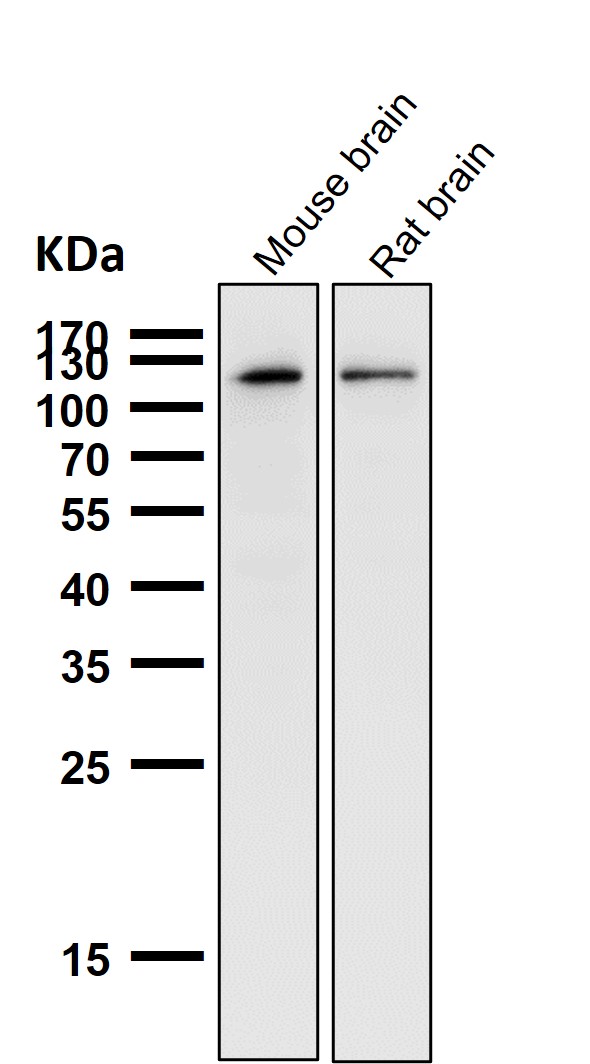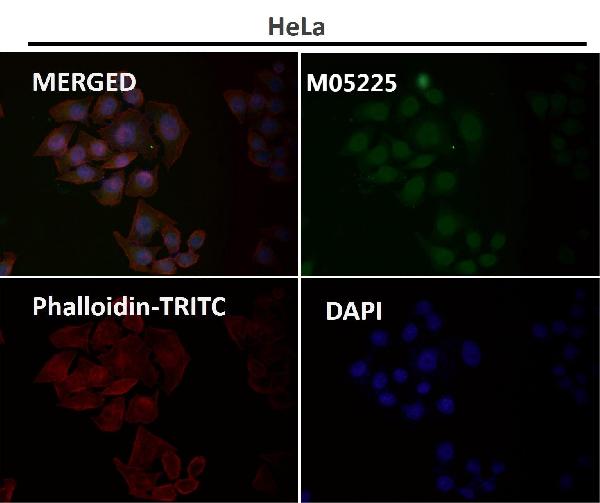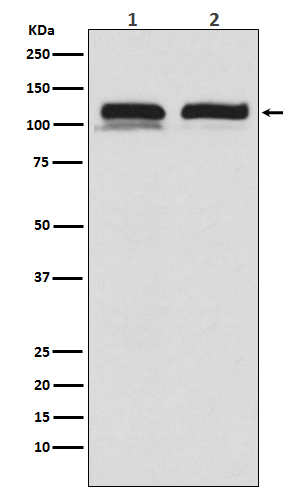Anti-USP11 Monoclonal Antibody
- SPECIFICATION
- CITATIONS
- PROTOCOLS
- BACKGROUND

Application
| WB, IF, ICC, IP, FC |
|---|---|
| Primary Accession | P51784 |
| Host | Rabbit |
| Isotype | Rabbit IgG |
| Reactivity | Rat, Human, Mouse |
| Clonality | Monoclonal |
| Format | Liquid |
| Description | Anti-USP11 Monoclonal Antibody . Tested in WB, ICC/IF, IP, Flow Cytometry applications. This antibody reacts with Human, Mouse, Rat. |
| Other Names | Ubiquitin carboxyl-terminal hydrolase 11, 3.4.19.12, Deubiquitinating enzyme 11, Ubiquitin thioesterase 11, Ubiquitin-specific-processing protease 11, USP11, UHX1 |
|---|---|
| Calculated MW | 109817 Da |
| Application Details | WB 1:500-1:2000 ICC/IF 1:50-1:200 IP 1:100 FC 1:200 |
| Contents | Rabbit IgG in phosphate buffered saline, pH 7.4, 150mM NaCl, 0.02% sodium azide and 50% glycerol, 0.4-0.5mg/ml BSA. |
| Clone Names | Clone: ADCC-21 |
| Immunogen | A synthesized peptide derived from human USP11 Protease that can remove conjugated ubiquitin from target proteins and polyubiquitin chains. Inhibits the degradation of target proteins by the proteasome. Plays a role in the regulation of pathways leading to NF-kappa-B activation. Plays a role in the regulation of DNA repair after double-stranded DNA breaks. |
| Purification | Affinity-chromatography |
| Storage | Store at -20°C for one year. For short term storage and frequent use, store at 4°C for up to one month. Avoid repeated freeze-thaw cycles. |
| Name | USP11 |
|---|---|
| Synonyms | UHX1 |
| Function | Protease that can remove conjugated ubiquitin from target proteins and polyubiquitin chains (PubMed:12084015, PubMed:15314155, PubMed:17897950, PubMed:19874889, PubMed:20233726, PubMed:24724799, PubMed:28992046). Inhibits the degradation of target proteins by the proteasome (PubMed:12084015). Cleaves preferentially 'Lys-6' and 'Lys- 63'-linked ubiquitin chains. Has lower activity with 'Lys-11' and 'Lys- 33'-linked ubiquitin chains, and extremely low activity with 'Lys-27', 'Lys-29' and 'Lys-48'-linked ubiquitin chains (in vitro) (PubMed:24724799). Plays a role in the regulation of pathways leading to NF-kappa-B activation (PubMed:17897950, PubMed:19874889). Plays a role in the regulation of DNA repair after double-stranded DNA breaks (PubMed:15314155, PubMed:20233726). Acts as a chromatin regulator via its association with the Polycomb group (PcG) multiprotein PRC1-like complex; may act by deubiquitinating components of the PRC1-like complex (PubMed:20601937). Promotes cell proliferation by deubiquitinating phosphorylated E2F1 (PubMed:28992046). |
| Cellular Location | Nucleus. Cytoplasm. Chromosome. Note=Predominantly nuclear (PubMed:12084015, PubMed:15314155). Associates with chromatin (PubMed:20233726, PubMed:20601937). |

Thousands of laboratories across the world have published research that depended on the performance of antibodies from Abcepta to advance their research. Check out links to articles that cite our products in major peer-reviewed journals, organized by research category.
info@abcepta.com, and receive a free "I Love Antibodies" mug.
Provided below are standard protocols that you may find useful for product applications.
If you have used an Abcepta product and would like to share how it has performed, please click on the "Submit Review" button and provide the requested information. Our staff will examine and post your review and contact you if needed.
If you have any additional inquiries please email technical services at tech@abcepta.com.













 Foundational characteristics of cancer include proliferation, angiogenesis, migration, evasion of apoptosis, and cellular immortality. Find key markers for these cellular processes and antibodies to detect them.
Foundational characteristics of cancer include proliferation, angiogenesis, migration, evasion of apoptosis, and cellular immortality. Find key markers for these cellular processes and antibodies to detect them. The SUMOplot™ Analysis Program predicts and scores sumoylation sites in your protein. SUMOylation is a post-translational modification involved in various cellular processes, such as nuclear-cytosolic transport, transcriptional regulation, apoptosis, protein stability, response to stress, and progression through the cell cycle.
The SUMOplot™ Analysis Program predicts and scores sumoylation sites in your protein. SUMOylation is a post-translational modification involved in various cellular processes, such as nuclear-cytosolic transport, transcriptional regulation, apoptosis, protein stability, response to stress, and progression through the cell cycle. The Autophagy Receptor Motif Plotter predicts and scores autophagy receptor binding sites in your protein. Identifying proteins connected to this pathway is critical to understanding the role of autophagy in physiological as well as pathological processes such as development, differentiation, neurodegenerative diseases, stress, infection, and cancer.
The Autophagy Receptor Motif Plotter predicts and scores autophagy receptor binding sites in your protein. Identifying proteins connected to this pathway is critical to understanding the role of autophagy in physiological as well as pathological processes such as development, differentiation, neurodegenerative diseases, stress, infection, and cancer.





